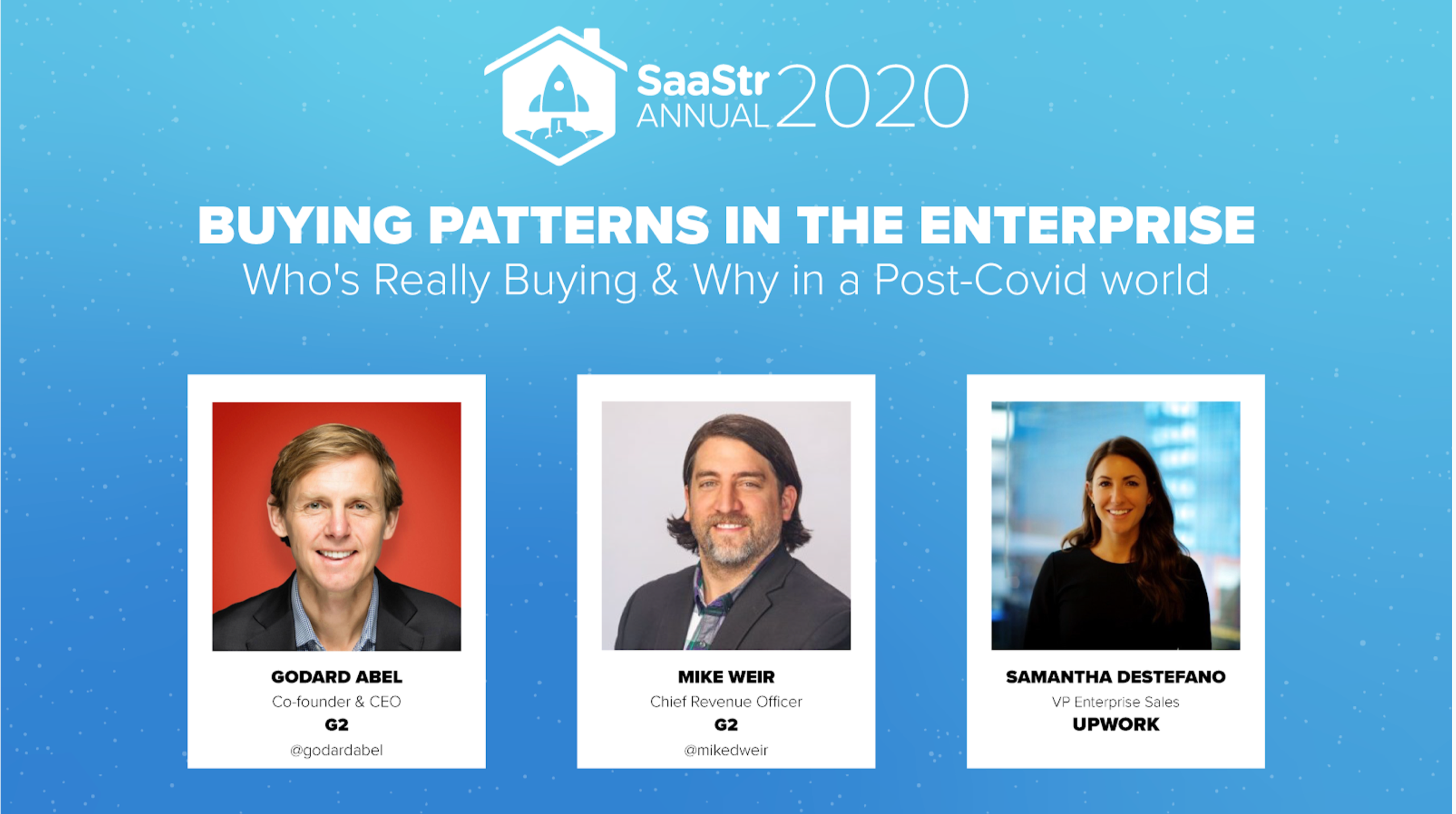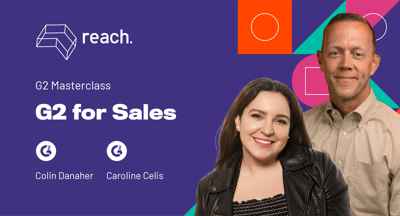September 3, 2020
 by Mary Clare Novak / September 3, 2020
by Mary Clare Novak / September 3, 2020

Pinching pennies is the norm during the seemingly everlasting COVID-19 pandemic.
The closure of restaurants, hair salons, and retailers makes it effortless for individual consumers to pause the ever-concerning disappearance of funds in their personal savings accounts.
For businesses, on the other hand, things look a bit different.
The shift to remote work has presented new challenges for businesses everywhere. Adapting to the environment created by COVID-19 has forced some companies to focus on being the customer once again and find the solutions they need to survive with a completely digital workforce.
This year at SaaStr Annual 2020, G2 Co-Founder and CEO Godard Abel virtually sat down with his own Chief Revenue Officer Mike Weir and Upwork’s VP of Enterprise Sales, Samantha DeStefano to discuss current buying patterns for enterprise companies and answer the quite literal million dollar question: who’s buying in this post-COVID world and why?
Abel kicked things off with some trends gathered from data on G2, where 40% of the 500 million software buyers are large “enterprise” companies with over 1,000 employees.
COVID-19 has given enterprise businesses no choice but to accelerate their shift to a digital transformation. When the pandemic first hit, G2 saw a tremendous increase in web traffic in certain categories, signifying that companies were taking that first step of conducting research to find the right solutions to support their business’ digital transformation. This was especially the case for software categories that enabled businesses to work digitally, such as webinar, video conferencing, and online learning platforms, as well as virtual healthcare solutions such as HIPAA compliant messaging.
G2 saw about
more buyers in the enterprise looking for digital collaboration software during COVID-19.
Another massive trend seen on G2 is the accelerated shift from selling via brick and mortar stores to moving to online e-commerce channels. Everyone is shopping online these days, and that was even the case before COVID-19 as well. In the first half of 2020, e-commerce revenue increased by 30% and thus enterprise buyers sought out the technology they needed to help them shift to online and self service channels.
Lastly, enterprises are taking a deep dive into their existing tech stacks and asking themselves some tough yet brutally crucial questions about software management:
Enterprises are scrutinizing their own software stack, and for good reasons, too. In fact, 30%of all software licenses go unused, and your average data breach can cost you upwards of $7.9 million. Saving on software and protecting your data should always be a priority for your business, but COVID-19 gave enterprises that extra push to re-evaluate.
Key takeaways from this section:
As experts in selling to enterprise buyers, DeStefano and Weir weighed in on the impact they’ve seen on enterprise buyers during the time of COVID-19.
Upwork focuses on granting access to global talent to enterprises, and their VP of Sales, DeStefano, admitted to being surprised at how accessible executives now are during the sales process. C-suites have had to adjust their areas of focus during COVID-19, and they’re looking for new solutions to complement those initiatives. As they explore their opportunities, executives want to hear about the benefits that a solution can offer their business firsthand, causing them to be more present when speaking with potential vendors. And when a customer brings a C-suite to a sales meeting, Upwork makes it a peer-to-peer conversation by involving theirs as well.
Related to DeStefano, Weir pointed out that the involvement of C-suites in buying conversations has taken the complexity up a notch. The more senior stakeholders at the table, the more boxes need to be checked. It’s leadership’s job to make sure that all departments that are going to depend on the solution being discussed are involved in the conversation. This has created a more diverse group of personas that need to be engaged with. Weir noticed that businesses are having to show how their solution can work across the customer’s entire strategy in hopes of being a one-stop-shop.
Key takeaways from this section:
Not only has COVID-19 reshaped enterprise buying, but it’s changed the way those businesses make their decisions as well.
DeStefano says it’s all about committee buying. Enterprise businesses want to be cautious and smart with the solutions they decide to spend their limited budget on, so it’s crucial to get input from all internal stakeholders. From a seller’s perspective, you can’t just sell to the decision-maker. You need to be able to sell to multiple personas with their own individual needs.
“The days of single point selling are gone.”
Samantha DeStefano
VP of Enterprise Sales, Upwork
The shift in company focus has also evened the playing field in terms of buying power. Those who once sat back and listened in a sales pitch might now have the authority to decide to move forward with your solution or go in a different direction. Again, this makes it more important than ever to have the ability to effectively sell to a wide array of personas.
Weir noted that more and more companies are starting to implement co-selling and co-development. People within an organization who really want to get the approval from leadership to buy a solution are looking to sales reps to prove their case and present it together.
Mike Weir
Chief Revenue Officer, G2
In terms of the speed of the decision-making process, it’s a mixed bag. At Upwork, enterprise sales cycles remained the same on average, with some companies accelerating digital initiatives and others taking more time to scrutinize a purchase.
Given that more and more parties are involved in a decision, that’s an encouraging sign for enterprise sellers that align well with their customers. Weir said the same goes for G2, which saw customer investments in digital marketing initiatives bounce back quickly after the initial COVID-19 shock, with growth especially strong in Europe.
Key takeaways from this section:
A question from the audience brought up the idea of businesses changing their messaging when selling to enterprises during the pandemic.
DeStefano confirmed that before COVID-19, everyone was all about growth and finding solutions that were nice to have. Now, the focus has shifted to the bottom line. To sell to that mindset, you must prove the ROI your solution can offer and how quickly it can happen.
Conversations on productivity and efficiency are a common occurrence in Weir’s world, especially since enterprises are expected to work remotely to an extent that they aren’t used to. He also mentioned that there are plenty of enterprises still with their eyes on that top line.
Mike Weir
Chief Revenue Officer, G2
The modern-day workforce looks a bit different than it did a year ago. Heck, there’s even been a drastic change since the beginning of 2020. Because the lives and daily activities of employees have been modified, there’s a call for new leadership and enablement strategies.
DeStefano says that plain and simple, the first step is to take a good look at the way you used to sell and adapt that to this entirely virtual world. And you can’t do that without leveraging the right tools to communicate with customers and coach sellers. DeStefano also says that as leaders, you need to equip your team with the opportunities and direction they need to succeed. On top of that, she stressed the importance of social proof and social selling in finding ways to sell in this new normal.
As a leader, Weir is focusing on practicing empathy in hopes that sales reps will do the same with their enterprise customers. Gathering personal and professional knowledge of external factors that are affecting a customer’s decision can help create a solid basis for understanding. This way, sellers can find better ways to deliver what their customers need, and customers feel taken care of.
Key takeaways from this section:
Businesses are taking extra precautions when buying during the COVID-19 pandemic, and price will always be a determinant in their decision to buy or walk away.
Upwork has offered creative deals with less upfront commitment to make it easier for enterprises to get started with a new initiative. This has allowed Upshot to reduce risk for its customers and prove value without having to change the long-term deal pricing structure.
Stepping in front of the cost and helping customers onboard and get started with a solution has accelerated deals for their team. For successful long-term enterprise relationships, it’s ultimately all about aligning with customers to provide maximum value, rather than just reducing cost.
That personal touch of taking a customer out to dinner is no longer an option for sellers during the COVID-19 pandemic. Companies are being forced to win trust digitally, which is a battle in itself.
Weir has simply taken that idea of building trust in-person and digitized it. For he and his team, fostering digital relationships looks like creating time to connect with customers. In his experience, having a virtual cup of coffee without making it a sales pitch helps maintain existing trust or build that foundation with new clients.
DeStefano leverages Upwork’s existing network and connects prospects to peers to initiate meaningful conversations. For example when talking with a prospective CMO customer, share how your company has helped their trusted peer CMOs have success on similar initiatives and offer to connect them directly. Enterprise buyers typically don’t trust sales and marketing pitches but they will definitely trust peer industry leaders for unfettered advice.
“Now more than ever, trust is going to come from this social aspect.”
Samantha DeStefano
VP of Enterprise Sales, Upwork
People are almost always willing to connect and have conversations with professional peers who are in a similar boat as them. Her advice is to become a champion of helping customers build out their own networks, so they can connect with peers that can share valuable professional advice.
Key takeaways from this section:
People have been forced to adapt in every which way during the COVID-19 pandemic, and businesses are no exception. Luckily for those of you selling to enterprise companies, this year’s SaaStr Annual conference included insights from some experts.
Looking for even more expert insight in 2020? Sign up for G2’s conference, REACH 2020. 100 speakers. All customized content. And totally free.
Mary Clare Novak is a former Content Marketing Specialist at G2 based in Burlington, Vermont, where she is explored topics related to sales and customer relationship management. In her free time, you can find her doing a crossword puzzle, listening to cover bands, or eating fish tacos. (she/her/hers)
Nothing stays the same.
 by Mara Calvello
by Mara Calvello
2024 was the year of tech giants touting the enterprise-readiness of AI software.
 by Sidharth Yadav
by Sidharth Yadav
G2 has long been a trusted tool by B2B marketers who have relied on the marketplace to source...
 by Colin Danaher
by Colin Danaher
Nothing stays the same.
 by Mara Calvello
by Mara Calvello
2024 was the year of tech giants touting the enterprise-readiness of AI software.
 by Sidharth Yadav
by Sidharth Yadav


